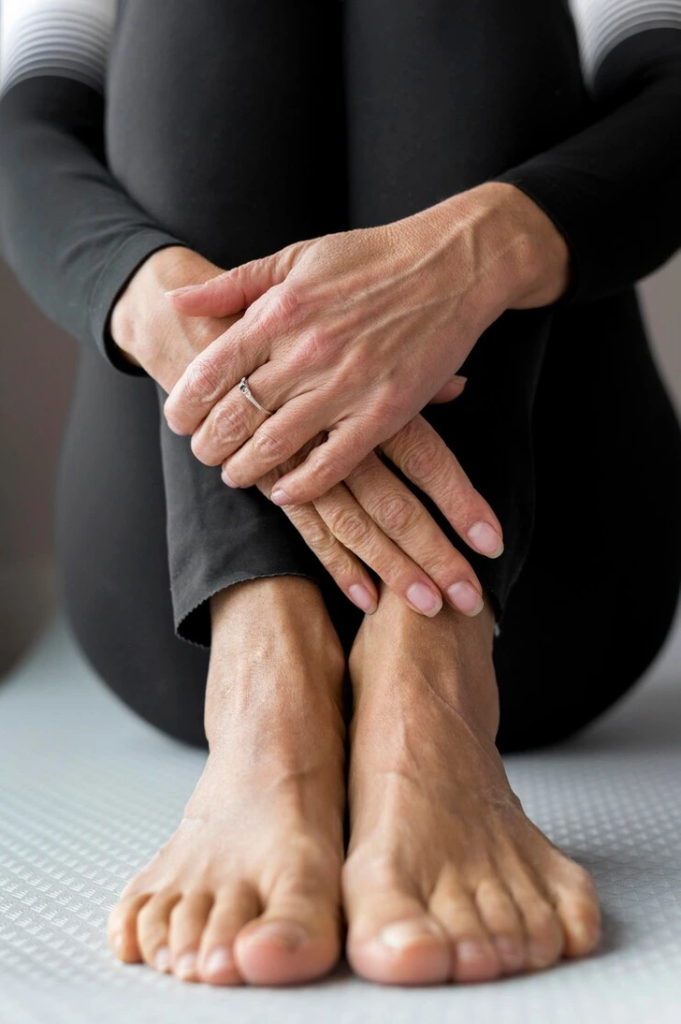Your feet do more than just get you from place to place—they can be a window into your overall health. Changes in their appearance, sensation, or function may signal underlying medical conditions that require attention. From circulation problems to nerve disorders, your feet can reveal important clues about your well-being. Here’s what your feet may be trying to tell you.
Cracked Heels – A Sign of Thyroid Issues?

Dry, cracked heels might seem like a simple cosmetic issue, but they could be linked to thyroid dysfunction. The thyroid gland regulates essential body functions, including skin hydration. If your heels are excessively dry and cracked, and you’re also experiencing fatigue, weight gain, or hair thinning, it might be time to check your thyroid levels.
While weather changes can also cause dry skin, persistent dryness along with other symptoms should not be ignored. Consulting a doctor can help determine if an underlying thyroid issue is the cause.
Crawling or Creeping Sensation in Your Feet

A tingling, creeping, or crawling sensation in your feet, especially at night, may indicate restless leg syndrome (RLS). This neurological disorder creates an irresistible urge to move your legs, making it difficult to relax or fall asleep.
RLS can be linked to iron deficiency, kidney problems, or even pregnancy. If you frequently experience these uncomfortable sensations, seeking medical advice can help identify the cause and provide relief.
Foot Cramps – A Sign of Nutrient Deficiency?

Muscle cramps in the feet can be incredibly painful and are often triggered by dehydration or excessive physical activity. However, frequent cramps may indicate a lack of essential minerals such as calcium, magnesium, or potassium.
To prevent foot cramps, stay hydrated, eat a balanced diet rich in leafy greens and nuts, and stretch your feet regularly, especially before bedtime. Pregnant women are particularly prone to foot cramps due to hormonal changes and increased pressure on the legs.
Always Feeling Cold in Your Feet

If your feet are constantly cold, even when the rest of your body feels fine, it could be due to poor circulation. Conditions like Raynaud’s syndrome cause blood vessels to constrict excessively, leading to cold, pale, or even bluish feet.
Poor circulation may also be a sign of atherosclerosis, a condition where arteries become narrowed due to plaque buildup. If you frequently experience cold feet along with numbness or pain when walking, a doctor can evaluate your circulation and recommend treatment.
Dry and Peeling Skin – Could It Be a Fungal Infection?

Peeling skin on the feet isn’t always due to dryness—it may indicate a fungal infection like athlete’s foot. This common condition thrives in warm, moist environments, leading to itchiness, redness, and flaking skin.
Ignoring a fungal infection can cause it to spread or worsen, leading to painful blisters and sores. If you suspect you have athlete’s foot, use antifungal treatments and keep your feet clean and dry to prevent reinfection.
Loss of Hair on Your Toes

Hair on your toes might seem unimportant, but it actually signals good blood circulation. If you notice sudden hair loss on your feet, it could be a sign of poor circulation or even diabetes.
When blood flow is restricted, the body prioritizes vital organs over extremities like your toes, leading to hair loss. If this change is accompanied by slow-healing wounds or numbness, consult a doctor to rule out diabetes or vascular disease.
Numbness in Your Feet – A Red Flag for Nerve Damage

Tingling, numbness, or a pins-and-needles sensation in your feet could indicate nerve damage. One of the most common causes is diabetic neuropathy, a condition where high blood sugar levels damage nerves over time.
Other potential causes include sciatica, which results from nerve compression in the lower back, and vitamin B12 deficiency. If numbness persists or worsens, a medical evaluation can help determine the cause and prevent further complications.
Pain That Worsens After Rest

Foot pain that intensifies after periods of inactivity, such as when getting out of bed in the morning, may be linked to plantar fasciitis. This condition occurs when the ligament connecting your heel to your toes becomes inflamed, leading to sharp pain.
Another potential cause is poor circulation, especially if the pain improves after moving around. If your feet ache frequently, stretching exercises, proper footwear, and medical treatment can help manage the discomfort.
How Diabetes Affects Your Feet

Diabetes can take a serious toll on your feet, leading to nerve damage and poor circulation. This combination makes it easy for small cuts or blisters to turn into serious infections.
Since diabetic neuropathy can cause loss of sensation, many people with diabetes don’t notice foot injuries until they become severe. This is why regular foot checks, proper hygiene, and well-fitted shoes are essential for preventing complications.
Managing blood sugar levels plays a crucial role in protecting your feet. If you have diabetes, work with a healthcare provider to monitor and care for your foot health.
Listen to Your Feet – They Might Be Warning You
Your feet can reveal a lot about your overall health. Whether it’s persistent pain, unusual sensations, or changes in skin and hair, these signs shouldn’t be ignored. Paying attention to your feet and seeking medical advice when needed can help you catch underlying health issues early and take action before they worsen. Keep an eye on your feet—they may be trying to tell you something important.


